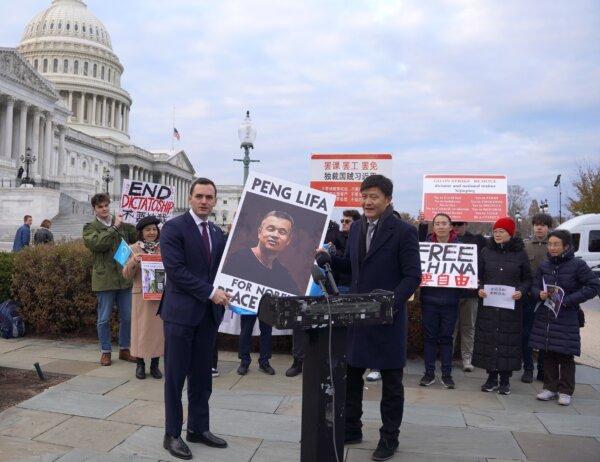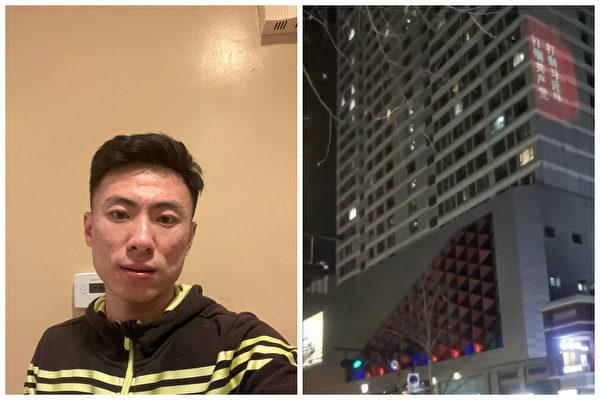To voice his concern about the heavy infiltration of the Chinese communist regime in Taiwan, and to safeguard Taiwan’s democracy, an activist decided to tell his story about his protest against the regime before Taiwan’s general election. He hopes his story will serve as a warning to the people in Taiwan, encourage them to cherish their vote, and be aware of the regime’s traps.
On Feb. 21, 2023, at 8 p.m. in China, a digital banner in bold white letters against a red backdrop appeared on the northern facade of Wanda Plaza in Jinan, Shandong. The message it conveyed was clear: “Down with the Communist Party, Down with Xi Jinping.”
Chai Song is the creator of the display. He recently decided to reveal the story to the media, months after he successfully fled from China.
“Protests can’t be fleeting,” he said, “sustaining one’s voice is paramount.”
After almost a year in the United States, Mr. Chai deliberated for quite some time before he decided to expose the matter to media attention.
“A lot of people are against the Chinese Communist Party (CCP), but many lack the courage to speak out for fear of personal safety. I believe that when such situations are avoided, it will trigger a wave of protests domestically,” he said to the Chinese language edition of The Epoch Times on Jan. 13, the day when Taiwan conducted its presidential election.
On the morning of Feb. 21, 2023, local time, Mr. Chai activated his phone-controlled remote electronic watch from a hotel in David, Panama.
Immediately after, an image of a banner with a red background and white letters “Down with the Communist Party, Down with Xi Jinping,” appeared on the northern wall of the building in the Wanda Plaza of Jinan City at night.
He left the hotel in David after he pressed the button, and headed north without stopping. “I notified them [friends in China] with messages on WeChat, but not a single person replied. I knew right away that they had been apprehended,” Mr. Chai explained.
The police cars quickly arrived, with sirens blaring in the night.
“At that time, there were personnel from national security, armed police, local police station, provincial department, and city bureau. They jointly formed a special task force. Just for my friend, more than 70 people went to his home to arrest him. It happened around 9 or 10 o'clock that night, and they made the arrest. The hallway was crowded, and the search for my father was no different, with a multitude of people involved, creating a hectic scene.”
His parents were interrogated for an entire week, coerced to tell their son to return to China.
Mr. Chai’s bank accounts were frozen, and his relatives were instructed not to assist him. The police even investigated everything since his birth, including his elementary school. His friend and girlfriend have remained missing to this day.
Another ‘Bridge Man’
His inspiration started with the brave act of Peng Zaizhou, known as the “bridge man.“On Oct. 13, 2022, the eve before the regime’s 20th national congress, Peng Lifa, known as Peng Zaizhou on Twitter, hung two large banners with red letters on the Sitong Bridge, a location where Beijing’s universities and technology companies are located.
The banners stated the rejection of the draconian zero-COVID measures and called the Chinese leader Xi Jinping a “national traitor.”
Mr. Peng has since gone missing.

Mr. Chai was inspired. However, he admitted that he is not as brave as Mr. Peng. To articulate his political concerns, he effectively organized a remote-controlled protest event—a well-thought-out plan encompassing projection, troubleshooting, and wiring.
“The Peng Lifa incident primarily embodies a spirit—he knew the significance of his actions and understood the potential consequences. He was ready to selflessly contribute, possibly even sacrificing his life for a reform in China. It’s this spirit that has had the most significant influence on me. It’s not just about the demands, but rather his spirit in defying the power!” said Mr. Chai.
Mr. Chai, a native of Hebei, had been doing real estate leasing in Beijing and Shandong for many years. He rented large residential buildings and then sublet them to customers, making a profit from the price difference. Unfortunately, the business suffered heavily from the three-year pandemic lockdown.
The lockdown obstructed his tenants from returning to town and paying the rent. “We suddenly found ourselves unable to endure the circumstances,” he explained.
The street closures and welding gates are the easiest control tactic of the authorities, “along with violence and coercion, thus restricting our freedom and rights,” he expressed.
On his way to Beijing, Mr. Chai personally observed the city’s refusal to admit non-city dwellers to major hospitals for medical care. Even in critical situations, their access to the city was blocked at the highway entrance.
“The health care resources were in a complete state of paralysis … It is essentially trampling on human life leaving people in a state of lack of preparation,” expressed Mr. Chai, highlighting the significant loss of life over the three-year pandemic and the cumulative anger among the populace.
A Remote-Controlled Protest on the Run
In Jinan, the capital city of Shandong province, he chose to stage the protest on a building in the pedestrian zone of Wanda Plaza facing Yingxiu Road, a bustling location with a huge pedestrian volume.“I deliberately selected a unit facing south. Beforehand, I measured and examined the windows and the angle toward the opposite side. Once satisfied with the measurements, I proceeded to rent the apartment and commenced the installation of equipment,” he said.
He went through painful deliberations in November and December 2022 and decided on Yingxiu Road.
After signing the rental contract, his chat with the landlord revealed that the landlord specialized in technical surveillance to assist police in capturing overseas activists. He felt uneasy and quickly terminated the contract with an excuse of insufficient lighting in the apartment, and rented another apartment.
To ensure the proper display of the banner, he tried projecting an eatery ad: “Quzhou’s Spicy Duck Heads, No Leftovers from Last Night.”
After fine-tuning the effect, he swapped out the lens inside the projector. To engrave the lens, he went the extra mile and purchased a laser engraver. “In China, nobody dares to engrave these words for you, so I had to do it myself,” he explained. He also installed a remote-controlled electronic watch to control the power switch of the projector.
Additionally, he set up a surveillance camera inside the room to allow him to monitor in real-time through his phone to see if anyone enters the room.
According to Mr. Chai, he never spent a night in the apartment.
In early January 2023, right after the pandemic restrictions were lifted, he made the decision to leave the country.
He said: “I couldn’t contain it any longer with all the anger and helplessness over those three years. I told myself I need to go. Initially, I planned to spend the New Year at home before leaving. I haven’t celebrated the New Year for years. But, I was worried that the travel or exit policies might change again, preventing me from leaving.”
The stringent lockdowns triggered widespread dissatisfaction among the people. Mr. Chai did not hide his plan from his friends.
On Jan. 18, 2023, he exited China from Macau and traveled through Thailand, Turkey, and then to Ecuador. He intended to activate the button to remotely display the banner when he was getting closer to the United States.
“The activation time was also strategically chosen,” he said.
After the CCP announced it would hold its Second Plenary Session of the 20th Central Committee on Feb. 26, when Xi Jinping’s reelection as president was confirmed, and the new leaders for the national institutions were elected, he decided to activate the display on the evening of Feb. 21, 2023.
In a hotel in David, Panama, Mr. Chai activated his phone-controlled remote electronic watch.
An image of a banner with a red background and white characters declaring, “Down with the Communist Party, Down with Xi Jinping,” lit in the evening on a northern wall of the Wanda Plaza building.
Upon entering the United States, Mr. Chai had conversations with officials from the Department of Homeland Security and the FBI. From these discussions, he learned that the CCP police were engaged in an international effort to capture him.
“I narrowly escaped death in Mexico. If the Mexican immigration authorities had apprehended me, they would have deported me back to China,” he said.
Recounting the experience, he wanted to let the people in Taiwan know: “We don’t have the right to vote, we can only vote with our feet,” referring to his concern about Taiwan’s democracy, and his belief that Taiwan demonstrates hope for the Chinese.
Taiwan carries “the only seed of civilization for the Chinese,” he stated.






